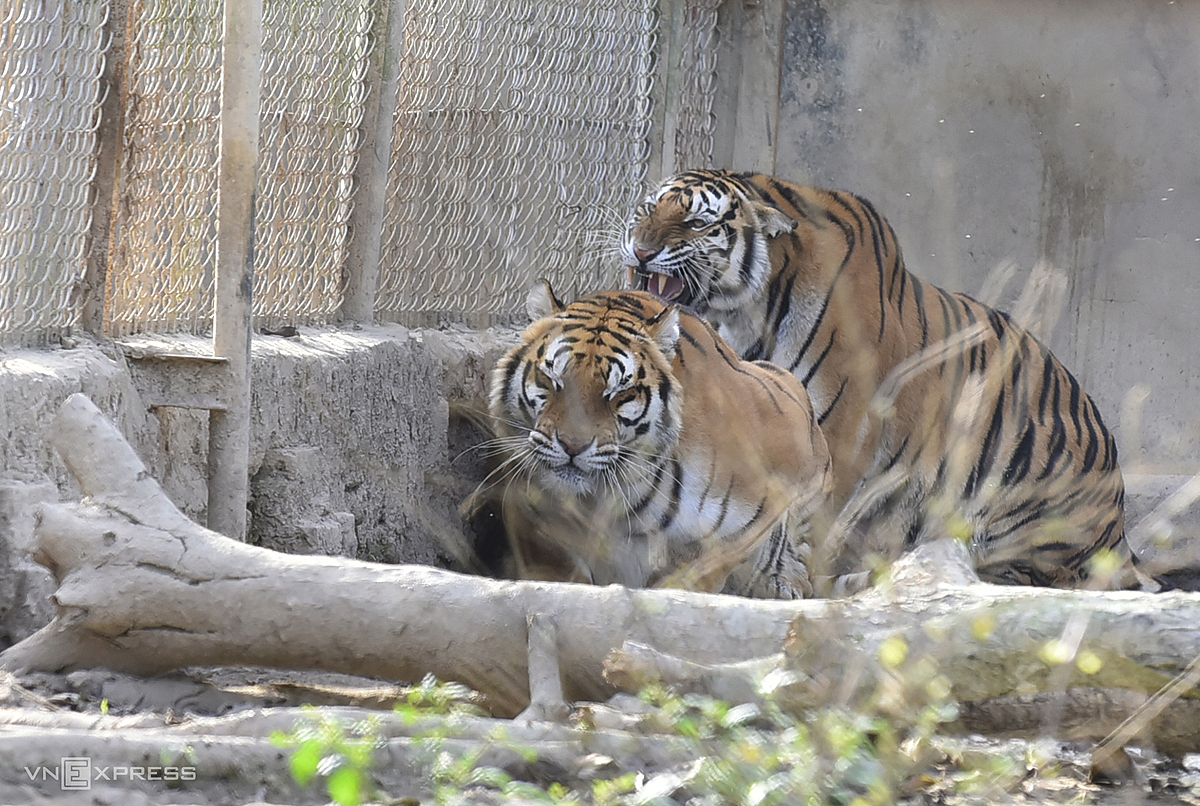Financial problems and complicated procedures have created a situation in which 11 tigers raised in captivity for 15 years remain unwanted in north-central Vietnam.
In 2007, Nguyen Mau Chien, a local in Thanh Hoa Province, bought 10 tiger cubs weighing around seven kilos each from an unidentified seller and brought them from Laos to Vietnam to raise near his home in Xuan Tin Commune of Tho Xuan District.
While his intent in making the purchase was not stated, demand for tiger parts for medicinal purposes has been high in Vietnam and China for a long time.
Chien was fined VND30 million ($1,300) for animal trafficking and tasked with raising the cubs.
In 2008, Chien bought another five tiger cubs from Laos and was fined the same amount. Once again, he was asked to raise the cubs with support from local authorities and the ranger force.
As the tigers grew up and became noisy, Chien’s family rented a field not very far from their home to build a “camp” to keep the tigers.
 |
|
Two of the tigers at the private camp of Nguyen Mau Chien in Thanh Hoa Province, February 2021. Photo by VnExpress/Le Hoang |
By 2012, four of the tigers became sick and died, and the remaining 11 have continued to live healthily until now in a 4,000 square meter area reinforced with walls, fences, and B40 wire mesh.
The biggest now weighs 200 kilos and the smallest 100 kilos.
In May 2017, the license granted to Chien’s family to raise adult tigers expired.
The family asked for a new license but this was refused by the Ministry of Agriculture and Rural Development because “there was not enough legal framework” for it, said Trinh Quang Tuan, head of the nature preservation office of Thanh Hoa Forest Management Department.
Since 2018, authorities have offered to take the streak of tigers off the family’s hands and given to wildlife rescue centers or other suitable organizations, but this has not happened over financial disagreements.
Chien wants to be compensated for what he has spent over the last 15 years to raise the tigers, but no organization is willing to do that.
Thanh Hoa authorities have contacted 11 wildlife rescue centers and zoos in the country that are qualified to keep the tigers. Some have refused outright to accept the tigers and others have said they would only do so without paying Chien any compensation.
The Education for Nature – Vietnam, an NGO with focus on wildlife protection, and several other wildlife protection organizations have called on the government, ministries and the administration of Thanh Hoa Province to seize the 11 tigers from Chien.
However, the authorities, after many meetings, have concluded that “there is no legal basis” for them to seize the tigers.
Meanwhile, under the Law on Biodiversity in 2008 and the Decree 160 on managing species on the list of endangered, precious, and rare species prioritized for protection, Chien’s family is not allowed to turn the tiger camp into a rescue center or a bio-tourism site.
Current laws regulate that they can continue to keep and raise the tigers but are not allowed to trade, transfer or kill the animals.
The camp where a streak of 11 tigers has lived in captivity for the past 15 years in Thanh Hoa Province. Video by VnExpress/Le Hoang
So far, forces from the agriculture ministry inspect the camp every three months and local ranger forces have to check on the tigers once a week. A log of every visit and inspection is maintained with signatures of all parties.
Both Thanh Hoa authorities and the province’s Forest Management Department have complained that it takes a lot of effort to conduct the checks and inspections without the teams not being paid for such work.
“We now hope that the higher authorities reconsider granting Chien’s family the permission for them to continue taking care of the tigers and provide them with financial support.”
Trinh Dinh Bach, who works with the family, said the tigers now consume around 100 kilos of food every day and along with other expenditures to take care of the animals, Chien’s family has to spend several hundred million dong (VND100 million = $4,400) per year.
He said: “This is a big sum and after all the years, we are financially exhausted.”
- Reduce Hair Loss with PURA D’OR Gold Label Shampoo
- Castor Oil Has Made a “Huge” Difference With Hair and Brow Growth
- Excessive hair loss in men: Signs of illness that cannot be subjective
- Dịch Vụ SEO Website ở Los Angeles, CA: đưa trang web doanh nghiệp bạn lên top Google
- Nails Salon Sierra Madre
 VnExpress News The News Gateway of Vietnam
VnExpress News The News Gateway of Vietnam





